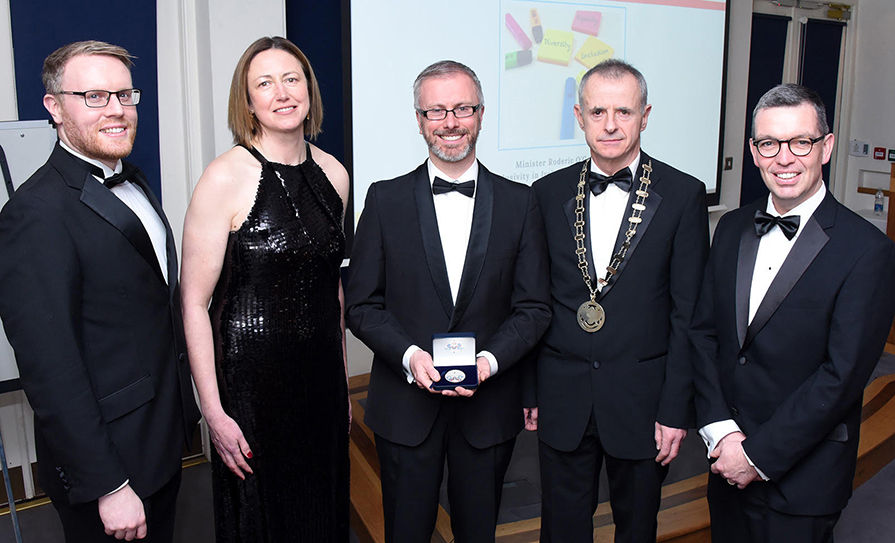







NOTE: By submitting this form and registering with us, you are providing us with permission to store your personal data and the record of your registration. In addition, registration with the Medical Independent includes granting consent for the delivery of that additional professional content and targeted ads, and the cookies required to deliver same. View our Privacy Policy and Cookie Notice for further details.
Don't have an account? Register
ADVERTISEMENT
ADVERTISEMENT









ADVERTISEMENT
ADVERTISEMENT

The ICGP has welcomed the publication of new ESRI research on the extension of free GP care to all in 2026. However, it warned it was “unrealistic” to expect universal free GP care by this date due to lack of GP capacity and infrastructure.
According to the College, many GP practices are already at full capacity and are unable to take on new patients. Many are also unable to find GPs to replace the retiring workforce.
Chair of the ICGP board Dr John Farrell said: “While the ICGP supports the extension of free GP care in principle, in practice this is unachievable without a huge expansion in GP numbers.”
“We welcome the research by the ESRI which estimates that there would be an additional 1.9 to 2.3 million GP visits in 2026 if free GP care is extended to all, as this gives clarity to the demands that universal free GP care would place on general practice.”
The extension of free GP care to the under sixes in 2015 led to a 30 per cent increase in GP visits. Extending free GP care puts a large strain on daytime practices, and even more pressure on out-of-hours services.
Medical Director of the ICGP, Dr Diarmuid Quinlan, said: “We have had an exceptionally busy winter period so far, and there is no surge capacity in the system. The ICGP is now training 70 per cent more GPs per year than it did six years ago, but we have an ageing workforce, with 25 per cent of our GPs over 60 years of age.”
He added: “We currently have over 4,000 GPs, of whom 570 are likely to retire by 2026. We need to increase the number of GPs to around 6,000 by 2028 to meet existing demand and cater for a growing population and GP retirements. Expanding free GP care will inevitably exacerbate patient waiting times to see GPs.”
The CEO of the ICGP, Mr Fintan Foy, said: “The ICGP has presented 10 workable solutions to the GP workforce crisis in our ‘Shaping the Future’ discussion document, and we urge the Minister for Health to establish a High-Level Working Group on the Future of General Practice, with all the relevant stakeholders. We cannot deal with the existing GP workforce crisis without innovative solutions, which go beyond a review of the existing contract.”
At present, there are 932 GPs in the four-year training programme, including an intake of 258 in July 2022. The College plans to increase training places to 286 in 2023 and will reach 350 by 2026.
To increase the numbers in training beyond that number requires not just more access to hospital posts, but also increased numbers studying medicine at an undergraduate level, who might then decide to do general practice specialist training.
ADVERTISEMENT
ADVERTISEMENT

The Department of Health has acknowledged that additional NCHDs will be required to fully implement the recent agreement reached with the IMO. In December, the union’s NCHD members overwhelmingly accepted the agreement with healthcare management that aims to address unsafe and illegal working hours and improve overall working conditions.
A Department spokesperson told the Medical Independent (MI) it “recognises and accepts” implementation will “require a range of measures and solutions across different sites, including the appointment of additional NCHDs”.
It would be a “matter for the HSE to develop solutions and to implement rosters in accordance with the agreement”, they outlined.
Asked about additional funding for posts, the Department spokesperson said “replacing any excessive overtime hours worked by NCHDs with standard hours through the recruitment of additional NCHDs would not require additional funding”.
Speaking to MI in late December, IMO NCHD committee Chair Dr John Cannon said the Organisation considered that implementing the terms of the agreement was achievable without severely impacting service provision.
According to Dr Cannon, some sites could implement the rostering rules “straight away without issue” and others would be capable of implementation with some exceptions. However, he said there were also sites that would find it “very hard” to implement the rules and would require an increase in NCHDs. Dr Cannon also said the new financial penalty system for breaches of the European Working Time Directive would “incentivise” sites to change their practice. In addition, the agreement sets out a system of compensatory rest days where rostering rules are breached and additional payment for NCHDs if these rest days are not provided.
Dr Cannon said a key difference with the old system was the union would have “line of sight” on the financial penalties and their distribution. According to the agreement, the monies must be used to support and benefit NCHDs employed in the relevant hospital, and at national level, 10 per cent of the fund from each hospital will be paid directly to medical schools running programmes for students from disadvantaged backgrounds.
“This is a very good agreement,” said Dr Cannon, “it is a stepping stone to a proper health system that protects its doctors.”
It was also agreed that negotiations on the development of a new NCHD contract would commence this month.
ADVERTISEMENT
ADVERTISEMENT

An internal audit into HSE property insurance found that the level of assurance about the “adequacy and effectiveness” of the governance, risk management and internal control system was unsatisfactory.
The HSE told this newspaper that it established a working group to implement the recommendations arising from the findings of the internal audit of HSE property insurance. The audit was issued on 15 July 2022.
“This working group includes members of Capital and Estates and the National Finance Division including internal insurance specialists,” the spokesperson told the Medical Independent (MI).
The objective of the group is to determine a plan to systematically address the recommendations arising from the internal audit report.
“Progress is ongoing with three of the findings currently implemented. The remaining recommendations (six) are expected to be implemented by quarter three 2023.”
The audit findings were discussed at the HSE audit and risk committee’s meeting in September, according to minutes.
A “key component” of the audit was to establish the accuracy and completeness of internal databases and registers used to record properties and their associated values, the meeting heard.
In response to the discussion, the committee “requested that major assets such as acute hospitals” should be revalued.
The HSE’s spokesperson told MI it has since conducted an “initial review of its insurance valuation and an initial uplift of its property portfolio has taken place”.
“The working group are tasked with delivering an updated detailed review which will determine if any further uplift on these valuations is required for insurance purposes. They are being assisted by external specialists in construction and property insurances, which will inform the outcome of the review as noted.”
ADVERTISEMENT
ADVERTISEMENT

Gastro-oesophageal reflux disease (GORD) is reflux which is associated with troublesome symptoms or complications in infants and children
Gastro-oesophageal reflux disease (GORD) is also called ‘gastric reflux disease’ or ‘acid reflux’. It is a condition which develops when the reflux of stomach contents causes troublesome symptoms such as heartburn, or complications such as oesophageal ulcers.
How common is GORD in the general population?
The most common cause of indigestion in Ireland, GORD affects up to one-in-four people. Some 10-to-20 per cent of people in the Western world have at least one bout of GORD per week. This figure is only about 5 per cent in Asia, which gives an indication that our Western diet, which tends to have a higher fat content, is a factor in GORD.
GORD can affect people at any age, including infants and young children. A typical sufferer is twice as likely to be male as female. It is also a common problem for babies and infants, leading to difficulty feeding in more severe cases. It can be controlled by food thickeners, alginates and removing cow’s milk from the infant’s diet if caused by lactose intolerance.
How common is GORD in infants?
The most obvious symptoms of reflux in infants is vomiting or regurgitation. All healthy infants have a tendency for GORD and it is natural for an infant to have a certain amount of regurgitation after feeding. The issue is whether GORD is causing a problem in an infant, rather than whether GORD is occurring at all. Reflux is most common between one-to-four months and approximately 67 per cent of infants have more than one daily episode of regurgitation at four months. Between the ages of six-to-seven months, symptoms of reflux decrease from 61 per cent down to 21 per cent. At 12 months of age, only 5 per cent have symptoms. By 12-to-18 months, most cases of GORD will resolve as the sphincter (valve between oesophagus and stomach) matures, the infant adopts an upright posture and begins having a more solid diet.
Symptoms of reflux in infants
Reflux causes frequent or recurring vomiting. This is not the small mouthfuls of vomit seen in all infants, but the vomiting of large amounts. This can happen straight after a feed, or right up until the next feed. When the infant’s oesophagus becomes sore from exposure to the regurgitated acid (the equivalent of heartburn), this leads to irritability, pain, and poor feeding. If GORD is severe, the infant may have difficulty gaining weight.
Other common symptoms of reflux include:
When to refer?
It is very rare for reflux to lead to serious complications. But some infants do have problems and the parent should see a GP if the infant vomits severely or has any of the following symptoms:
Treatment
Avoid overfeeding and try increasing frequency and decreasing volume of feeds. The infant should be supported in an upright position whilst feeding and for at least 45 minutes after feeding to bring up wind. The infant should be handled very gently after feeding and during winding; avoid vigorous patting or rocking.
GORD tends to be worse when lying flat and therefore a gentle raise of the head of an infant’s cot can be useful, so that the infant’s head is higher than the rest of their body while they sleep. This can be done by putting a pillow or folded blanket under the mattress to create a gentle up-slope. Never attempt to let the infant sleep directly on a pillow, which could be dangerous.
The issue is whether
GORD is causing a problem in an infant, rather than whether GORD is occurring at all
Products to add to an infant’s food
By thickening their food, an infant is less likely to bring it back up. There are products to thicken an infant’s
milk, for example, Instant Carobel. There are also ready-thickened milk substitute formulas for babies who are bottle fed.
If breastfeeding and the infant is having problems with bringing up food, Gaviscon Infant sachets may be used.
Infants are less likely to bring up food if they have sodium alginate (Gaviscon Infant) mixed with their feed or dissolved in water after their meal. Sodium alginate works in three ways: It thickens the milk, making it easier for the infant to cope with; coats the oesophagus all the way down to the stomach; and in the stomach, it forms a raft over the stomach contents, helping to stop the contents of the stomach from escaping back up the oesophagus. Dosage depends on the weight of the infant. Gaviscon Infant sachet(s) can be mixed with cool boiled water, milk feed or expressed breast milk. Gaviscon Infant sachet(s) should not be administered more than six times in 24 hours.
Gaviscon Infant should not be given to premature infants, young children who are ill with a high temperature, diarrhoea, vomiting, or if already using a
food thickener.
Medication
Anti-reflux medicines reduce the severity of the reflux by improving the downward movement (ie, motility) of the oesophagus and stomach. They may also reduce acidity so that the reflux is less damaging to the oesophageal lining. They are generally only used if other treatment options like thickeners do not work.
Domperidone helps tighten the valve (the sphincter) at the end of the oesophagus where it joins the stomach. This will help stop food from flowing back into the oesophagus. It comes in liquid or rectal (suppository) form for infants and children, but is only available with a prescription. Directions: By mouth – over one month and body weight up to 35kg, 250-500mcg/kg three-to-four times a day; body weight 35kg and over, 10-20mg three-to-four times daily, max 80mg daily. By rectum – body weight over 15kg, one 30mg Motilium suppository twice a day, body weight over 35kg, 60mg twice-daily. Some young children taking domperidone may get mild diarrhoea.
H2 blockers reduce the amount of acid in the stomach. Ranitidine, a type of H2 antagonist, was often used for GORD in infants until it was recalled in 2019.
Omeprazole liquid (available as an unlicensed medication in Ireland) and Losec MUPS (omeprazole) are the most used proton pump inhibitors (PPIs) for children. Losec MUPS can be dissolved in water, which is convenient for children’s dosage. A PPI reduces the acidity of the stomach’s contents and is more potent than H2 antagonists. The dose for infants and young children is based on body weight and the doctor will decide the correct dose. Directions: Newborn infant under four weeks, 700mcg/kg once-daily, increased if necessary after seven-to-14 days to 1.4mg/kg once-daily. Child one month to two years, 700mcg/kg once-daily, increased if necessary to 3mg/kg, max 20mg once-daily.
Dosage range for omeprazole by weight:
Surgery
Surgery is required in a minority of infants with severe GORD who do not respond to treatment; surgery is not always successful. Sometimes medication needs to be continued after surgery.
Disclaimer: Brands mentioned in this article are meant as examples only and not meant as preference to other brands.
Bibliography
Galmiche JP, Janssens J; The pathophysiology of gastro-oesophageal reflux disease: An overview. Scandinavian Journal of Gastroenterology. 1995, Vol 30, No s211,
Pages 7-18
PJ Kahrilas. Gastro-oesophageal reflux disease. New England Journal of Medicine, 2008
All PPIs are equivalent for treatment of GORD (POEM). The Pharmaceutical Journal. Vol 275 No 7380 p736. Dec 2005
Nickless G, Morgan P. Gastro-oesophageal reflux disease and its management. The Pharmaceutical Journal,
1 Dec 2009
Patient information from the BMJ Group. GORD in young children. March 21, 2012
Stringer D, MS FRCS FRCP. Gastro-oesophageal reflux. TOF young children by TOFS (Tracheo-Oesophageal Fistula Support)
The Royal Young Children’s Hospital Melbourne. Clinical practice guidelines: GORD in young children. May 2012
Liburd J, Hebra A. GORD. eMedicine, May 2009; Paediatric article
ADVERTISEMENT
ADVERTISEMENT

A ballot of NCHD members of the Irish Medical Organisation (IMO) has voted in favour of an agreement negotiated by the IMO with the HSE and the Department of Health which will help to eliminate unsafe and illegal working hours, according to the union.
This agreement will also aim to tackle difficulties in getting paid for hours worked, guaranteed access to leave for essential exams, payroll problems and it will see employers being penalised for noncompliance.
Additionally, the IMO secured negotiations on an entirely new NCHD contract, to commence in January.
The ballot concluded on 19 December at midnight. Of the votes cast, 81 per cent of the NCHDs were in favour of accepting the agreement.
Chair of the IMO NCHD Committee, Dr John Cannon, welcomed the outcome of the vote: “This agreement is a milestone in our campaign to reform working conditions for NCHDs in the Irish health services. However, it does not mark the end of our campaign.
“The real goal remains to negotiate a comprehensive, fit-for-purpose new contract for NCHDs, and that task begins in new negotiations in January. We expect that the HSE and all hospitals will now abide by the terms of this agreement and the IMO will be monitoring compliance.
“NCHDs have been left to deal with unsafe working conditions for too long and if the HSE does not ensure compliance we will take industrial action.”
The agreement follows extended negotiations between the IMO NCHD Committee and the HSE and the Department of Health. Those negotiations followed an overwhelming vote by NCHDs in a ballot conducted earlier this year, where 97 per cent voted for action up to and including industrial action.
Key elements of the agreement include:
ADVERTISEMENT
ADVERTISEMENT

GP out-of-hours services are preparing for a rise in presentations over the Christmas period and are seeking further funding to manage the increase.
Speaking to the Medical Independent, Chair of the National Association of GP Co-ops, Dr Ken Egan, said a quarterly national meeting of co-oops, held on 24 November, heard that out-of-hours services are currently “flooded with work”.
He said: “The co-ops are reporting now that we have Christmas figures across the board for the last two or three weeks. And there’s a concern as to if it keeps increasing, the actual Christmas [period] itself is going to be horrific.”
Dr Egan said that “at the moment” the services are managing and morale among GPs is “quite good… because co-ops are used to being busy”.
“But there is a certain fear… there will be a collapse of the system and patients won’t be able to access co-ops.”
Dr Egan added that there has been no allocation of resources to deal with the anticipated increase in presentations.
Each co-op has a service-level agreement with their local HSE area, which have been informed about the pressure services are under, he said.
However, there has been no official response received in terms of additional funds.
Dr Egan said without these extra resources there will be “a huge wait for patients who want to avail of the co-ops”.
“The public will have to realise that co-ops are not easily accessible and won’t be if it… gets busier than it has been.”
Dr Egan also highlighted the difficulty in attracting local GPs to take up work in co-ops or provide cover as locums due to high workloads in daytime practice and that “it’s looking as if it’s going to get more difficult”.
ADVERTISEMENT
ADVERTISEMENT

The HSE has launched the National Strategy for Accelerating Genetic and Genomic Medicine in Ireland. The strategy, which is the first of its kind in Ireland, outlines the planned development of an enhanced patient and family-centred genetic and genomic service that will be coordinated nationally.
The strategy was developed in collaboration with the Department of Health and healthcare professionals, international experts, academics, patient representatives and advocates. Provided under this strategy is:
Speaking at the launch, Dr Colm Henry, HSE Chief Clinical Officer explained: “Advancing Ireland’s genetics and genomics service means improving healthcare for everyone in Ireland, because it will allow for increased disease prevention, better diagnostics, more targeted treatments, and better patient and family outcomes.
“Through this new expert-informed strategy, we can work toward a future where genetic and genomic medicine will be part of routine care delivery that can be accessed equitably across the country, from visits to the GP to extended care for rare disease or cancer.”
Speaking to the Medical Independent in November, Dr Henry also said one of the first actions as part of the strategy will be establishing a national office.
“The key for us will be establishing this office, which will be the hub through which we will drive the different elements of the strategy and through which we will seek and secure funding, hopefully, from the department on a multi-annual basis,” he said. “So we can go from having islands of excellence to having a complete island of excellence in regard to genetics and genomics.”
Dr Mark Bale, former Genomics Advisor to the UK Department of Health and Chair of the National Genetics and Genomics Strategy Steering Group, said: “In the development of this strategy, we’ve noted examples of excellence in genetics and genomics evident throughout the country. However, because of the collective, invaluable contributions of over 100 experts, healthcare professionals, advocates and patient representatives, Ireland now has a comprehensive strategy.
“This provides a way forward for progressing this exciting field of medicine to improve citizen health and wellbeing whilst advancing research, innovation, and discovery. I have every confidence that Ireland will rise to this occasion, beginning with implementation in early 2023.”
Patient and public involvement was a key feature throughout the development of the strategy, and the HSE said they are committed to continuing to centre patient voices throughout its implementation.
Director of the HSE’s Strategic Programmes Office, Ms Deirdre McNamara said: “It was a pleasure and a privilege to have the input of so many patient representatives and advocates in this process, and their contributions certainly shaped the content of the strategy in many ways. It is essential that the needs of patients and their families continue to be at the heart of the design and development of any new genetic and genomic services or initiatives in Ireland.”
Genomics is the study of the body’s genes, their functions and their influence on the growth, development and working of the body. A genome is an organism’s complete set of DNA, including all of its genes. Genetic testing can be used to examine particular individual genes within the genome, and whether a person is carrying a specific inherited altered gene that causes a particular medical condition. Genomic medicine uses information about a person’s genetic makeup in devising innovative and effective new treatments and care pathways for patients.
ADVERTISEMENT
ADVERTISEMENT

The new fit-for-purpose GP training facility for the Cork GP Training Scheme was officially opened today (7 December) at St Mary’s Health Campus, in Gurranabraher, Cork.
The new facility provides an enhanced and larger learning environment for GP training in the city and region, with plans for further expansion.
It also represents a strong partnership between the Irish College of General Practitioners (ICGP), the HSE, University College Cork (UCC) and Cork City Council, the ICGP said in a press statement.
The ICGP’s National Director of GP Training, Dr Martin Rouse, said: “This is a significant milestone in the history of GP training in Cork. From its establishment in the early ’70s, the Cork GP Training Scheme has maintained huge support from the General Practice community, the old Southern Health Board (now HSE) and, in particular, UCC. The links with UCC have always been strong and while moving some distance from the main UCC campus on the Western Road, this modern fit-for-purpose facility will continue these links and ensure a healthy future for the training of General Practitioners for the region. “
He added: “It is a tribute to the vision of past Directors of GP Training in the region from Dr Owen Shorten, Prof Bill Shannon, Dr Harry Comber and most recently Dr Paddy Ryan whose foresight and persistence was key to delivering this wonderful facility.”
The ICGP is leading an expansion in GP training numbers nationally to help meet GP shortages, impending retirements and the growing diversity of GP services in primary care.
Last month, the ICGP received a record 968 applications for the 2023 GP Training Programme, “reflecting the growing popularity of general practice as a career for medical graduates”, the college said in a press statement.
Dr. Rouse also said: “There are currently 932 trainees enrolled in the GP Training Programme across the country, and we have increased our training numbers by 60 per cent in the past six years.”
The Director of the Cork GP Training Scheme, Dr Sheila Rochford, welcomed representatives from UCC, the HSE and the Lord Mayor’s office to the official opening.
“We are delighted to be based here in Gurranabraher while keeping our close links with UCC,” she said. “The expansion of GP training in the region will help strengthen primary healthcare services, and it’s a recognition of the strong support we receive from the HSE that this facility is now in place. From 12 training places, we have now 24 trainees on-site, and we look forward to growing those numbers in coming years.”
ADVERTISEMENT
ADVERTISEMENT

The Director of the National Centre for Pharmacoeconomics, Prof Michael Barry, has told this newspaper that all patients who would benefit from the cystic fibrosis (CF) drug, Kaftrio, should have access to the medication.
Currently, 140 children in Ireland have access to the drugs ivacaftor/tezacaftor/elexacaftor (branded as Kaftrio) under an agreement with the pharmaceutical company, Vertex.
However, 35 children, aged between six and 11, with a particular genotype, do not have access to the medication.
Speaking to the Medical Independent (MI) at a recent Health Research Board conference on precision medicine, Prof Barry said: “My position is that there was an understanding that the drug would be made available for all patients who would benefit from it. And that just doesn’t seem to have happened in the case of 35… children and I think they should get access to it.
He continued: “The HSE’s understanding was that people who were eligible for [Kaftrio] would get access to it under the portfolio deal. I think that should still remain the case.”
Prof Barry acknowledged the ongoing negotiations taking place in the dispute with Vertex. “I’m not sure what the outcome will be,” said Prof Barry. “But there was an agreement, and I think it should stand that everybody who is eligible should get access to it.”
In response to his comments, a spokesperson for Vertex told MI the patient population of the 35
children were not included in the original agreement as “it was not known at that time that our
medicines would work in these patients”.
The spokesperson added: “Vertex is committed to seeking a rapid resolution, together with the HSE
and these discussions remain the highest priority for Vertex. These talks with the HSE remain
constructive and active to secure a path forward.”
In October, Cystic Fibrosis Ireland (CFI) held a meeting with the Minister for Health Stephen Donnelly regarding the Kaftrio dispute.
In a press statement after the meeting, the organisation said: “[We] urged the Minister to consider the possibility of allowing immediate access to Kaftrio for the 35 children, without prejudice to a final agreement on pricing. We further urged the possibility of seeking international arbitration to resolve the present impasse.”
CFI added that the dispute had “the potential… to damage excellent relationships and partnerships built up over many years”.
ADVERTISEMENT
ADVERTISEMENT

The National Traveller Health Action Plan (NTHAP) 2022-2027 launched today (28 November) aims to improve the health experiences and health outcomes for Travellers.
The Department of Health is providing additional ring-fenced funding of €1 million in 2023 to support the implementation of the plan, with a further €300,000 specifically for mental health services.
The NTHAP acknowledges the health inequalities that Travellers experience, arising from the social determinants of health and the obstacles they can face in accessing healthcare services. It will provide a solid foundation upon which to build and maintain a legacy of success in addressing the additional health needs of the Traveller population, according to the HSE.
Minister for Health, Stephen Donnelly said at the launch: “Today is about accepting the reality, acknowledging that in the past enough has not been done, [and] putting in place a plan for the future to make sure that the services that are needed for Traveller men, women and children are provided.”
He also said in a press statement: “[The NTHAP] is a comprehensive public health response to the health needs of Travellers, that that sets out tailored and affirmative measures to prevent disease, promote health and prolong life, and are delivered in partnership with Traveller. In particular, I welcome the focus on the mental health needs of Travellers, which is in line with the prioritisation of Travellers in my Department’s mental health policies.”
“To address the needs of Traveller women who experience homelessness additional funding is being provided from the Women’s Health Action Plan,” he added.
The plan includes health and social care interventions that will have the most impact on Traveller health, including mental healthcare and chronic disease diagnosis, early interventions and management.
The NTHAP contains 45 actions, which include:
Ms Mary Brigid Collins, Primary Health Care for Travellers representative on the National Traveller Health Action Plan Steering Group, said: “I am delighted at the publication of this much-needed National Traveller Health Action Plan. I believe it has the potential to bring about real positive change for Travellers around the country.
“It has Traveller inclusion at the centre of the plan and recognises the impact of racism, discrimination, poor living conditions, poor outcomes in education and unemployment have on health outcomes.
“It recognises also the importance of active Traveller participation and the role of Traveller Health Units and Traveller Primary Health Care Projects. Travellers look forward to continuing to work with the [HSE] and the Department of Health and will continue to highlight the need for recurring and realistic budgets if we’re serious about implementing the plan.”
The Minister for Children, Equality, Disability, Integration and Youth, Roderic O’Gorman said: “We know that Travellers have poorer health outcomes than that of the general population, and face particular challenges in accessing health care services.
“The development and implementation of a detailed action plan to address the specific health needs of Travellers is an action of the National Traveller and Roma Inclusion Strategy [NTRIS], which is led by my Department, and is a key commitment of the Programme for Government.”
The HSE plans to establish a steering group before the end of 2022 to monitor and report on the implementation of the plan at national and regional levels. Traveller Health Units will also develop a 5-year implementation plan and publish an annual report.
ADVERTISEMENT
ADVERTISEMENT

The Medical Independent (MI) understands that the contract negotiations between the Department of Health, the HSE and the representative bodies are in the “final stages”.
Officials with the Department of Health and the HSE have been involved in negotiations with the consultants’ representative bodies, the IHCA and the IMO, since June under the new Chair appointed at that time, Mr Tom Mallon.
Sources close to the talks told MI that the process was in the “final stages”, and that they “think a deal is close”.
In an interview with the Sunday Business Post on 13 November, Minister for Health Stephen Donnelly described the negotiations as “very close” to being finished.
Minister Donnelly said he believed talks will result in a “very attractive contract”. On 14 November, The Irish Times reported that the Cabinet committee on health was set “to discuss an improved salary offer” for consultants that could pave the way for a deal.
However, neither the IHCA nor the IMO would comment on the salary speculation or progress in the talks when contacted by this paper.
“Given the agreement between all parties on confidentiality, it would not be appropriate to say anything further in relation to the details of the negotiations,” a Department of Health spokesperson told MI.
“The Government is committed to introducing the new contract as soon as possible.”
An agreed new consultant contract is “critical” to attracting doctors back to Ireland, the Medical Director of HSE National Doctors Training and Planning (NDTP), Prof Brian Kinirons, told this newspaper.
Speaking to MI at the recent conference in Dublin marking the launch of the NDTP Strategic Plan 2022-27, Prof Kinirons said a new contract “does matter” in the context of recruitment.
“I think it is about creating an environment where people want to work in,” he said. “So the contract is critical. We want to create a contract that is actually attractive, that will actually bring people back to Ireland. We don’t want to create barriers to that.”
ADVERTISEMENT
ADVERTISEMENT
ADVERTISEMENT
ADVERTISEMENT
ADVERTISEMENT
The public-only consultant contract (POCC) has led to greater “flexibility” in some service delivery, according to...
There is a lot of publicity given to the Volkswagen Golf, which is celebrating 50 years...
As older doctors retire, a new generation has arrived with different professional and personal priorities. Around...
Catherine Reily examines the growing pressures in laboratory medicine and the potential solutions,with a special focus...
ADVERTISEMENT
ADVERTISEMENT
ADVERTISEMENT
ADVERTISEMENT
ADVERTISEMENT